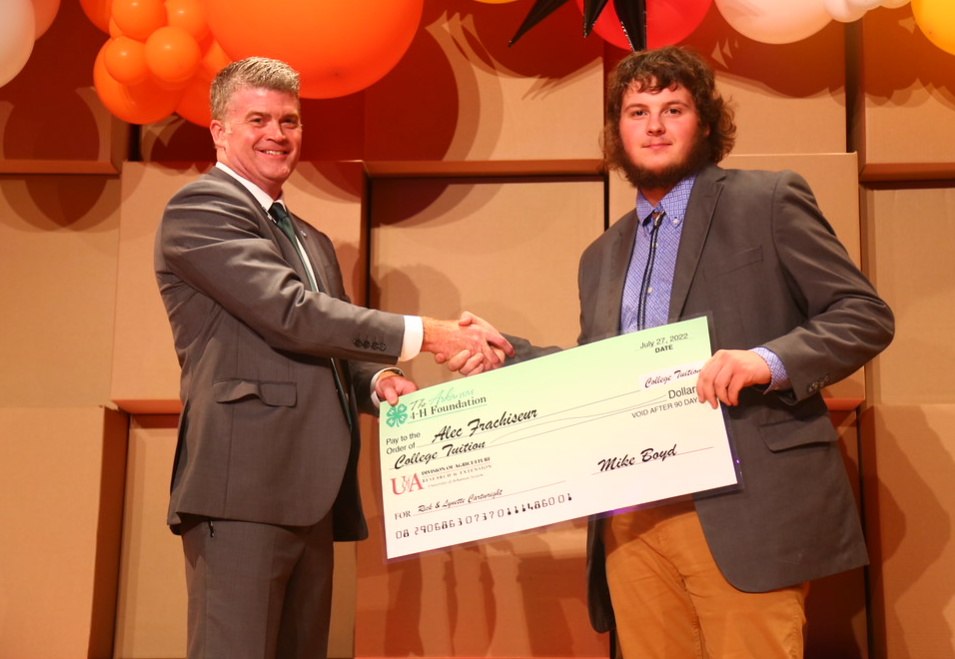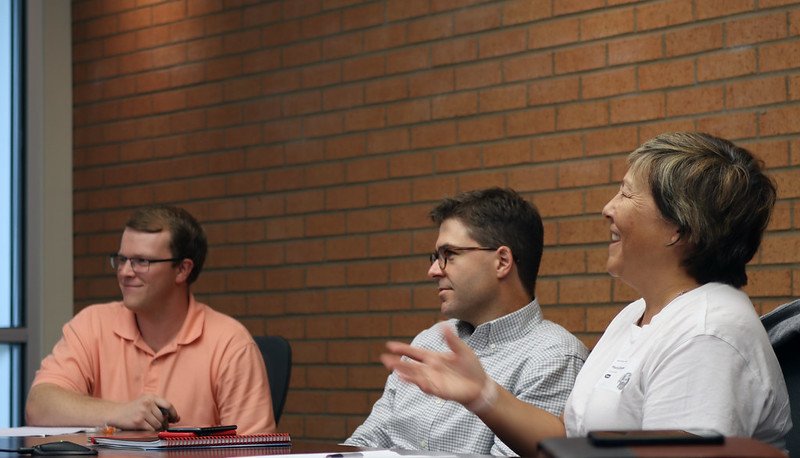By Tracy Courage
U of A System Division of Agriculture
LITTLE ROCK — Years of detailed project work, community service and leadership efforts have paid off for 32 4-H members in the form of college scholarships.
The Arkansas 4-H Foundation recently awarded $24,000 in college scholarships to youth across Arkansas. Amounts ranged from $500 to $8,000.
“These scholarships directly help our 4-H members continue to excel,” John Thomas, managing director of the Arkansas 4-H Foundation, said. “These would not be possible without generous donors, many of whom are former 4-H members who want to pay it forward for future generations.”
The Arkansas 4-H Foundation has awarded more than $170,000 to 4-H members this year, enabling them to attend summer camps and leadership and citizenship trainings. The foundation also provides sponsorships for more than 40 students with winning record books to attend National 4-H Congress in Atlanta each year, a trip valued at $1,500 per person.
Record books reflect each student’s achievements in leadership, community service and work in their chosen projects. 4-H offers more than 70 projects spanning the arts and humanities, healthy living, civil engagement, animal and plant sciences, engineering and technology.
This year’s scholarship recipients include:
Sue Marshall Scholarship — Abby Frizzell of Johnson County and Kristin Lehmann of Conway County each received $8,000 to pursue collegiate studies in family and consumer sciences.
Ada & Tyrell Anderson Scholarship — Emma Gardner of Washington received the $6,000 scholarship awarded to a 4-H member from Madison or Washington County to attend a college or university in the University of Arkansas System.
Robert D. and Betty F. Oliver Scholarship — Jordan Thomas of Pulaski County, $4,000.
Rick and Lynette Cartwright Scholarship — Alec Frachiseur of Sevier County, $3,500.
Raydus Ree and Virginia Williams James Scholarship — Weston Penny of Washington County, $3,500.
C.A and Joye Vines Scholarship — Kallyn Sossamon of Saline County, $1,000.
Farm Credit Cooperatives Scholarship — Hannah Riggan of Hot Spring County and Alex Trombley of Howard County each received $1,000 to pursue an agriculture-related course of study in college.
Dennis R. Millard Memorial Scholarship — Savannah Barrentine of Grant County received the $1,000 award, which recognizes a person who has demonstrated outstanding leadership, community service and mentoring of other 4-H members.
Rotary Club of Fayetteville and Dale Killian Scholarship — Janna Morse of Washington County received the $1,000 scholarship, which is awarded to a Washington County student enrolling at the University of Arkansas.
Gladys Klepfer/ Bo & Peggy Cobb Scholarship — Rob Phillips of Arkansas County and Savannah Loving of Johnson County each received a $1,000 scholarship, which is awarded to members who have served as volunteer camp counselors at the Arkansas 4-H Center.
John W. White Scholarship — Erin Holland of Van Buren County received a $1,000 award to pursue agriculture or human environmental sciences at the University of Arkansas.
Zack O. and Jennie D. Jennings Scholarship — Annabelle Ferren of White County received the $1,000 award for outstanding leadership.
Division of Agriculture Livestock Scholarships
Ethan Wolcott, Hunter Frachiseur and Madison Bagley, all of Sevier County, each received $1,000. The scholarships are awarded to youth who have exhibited livestock at the Arkansas State Fair and Livestock Show within the past year and who plan to pursue an agriculture-related major in college.
Oaklawn Jockey Scholarships — $625 each
Rylee Kelley, Searcy County.
Riley Pearce, Faulkner County.
Mollie Leonard, Van Buren County.
Caylee Turner, Little River County.
Larry Sandage Arkansas Forage and Grassland Council Scholarship — Grace Rutherford of Clark County received the $500 scholarship to a pursue studies related to a career in forage, grass or the cattle industry.
Regions Bank Scholarship — Emmarie Savell, Izard County, $500.
Raymond Cox Scholarship — James Daniell of Clark County, Tayte Christensen of Benton County and Magon James of Arkansas County, each received $500 for outstanding 4-H work.
Maeda Asbell Scholarship — Josalyn Allbritton of Chicot County received $400 for outstanding 4-H work.
For more information about 4-H, visit https://4h.uada.edu/. To learn more about other extension programs in Arkansas, contact your local Cooperative Extension Service agent or visit uaex.uada.edu. Follow us on Twitter at @AR_Extension.






















